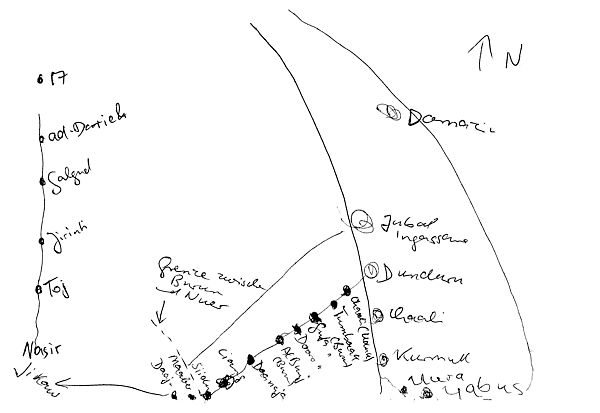In the night it rained, so we decide to go back to the asphalt road. There we meet Adam Jibriil, a MBS of Harun Ibrahim Barka. Notes from the conversation by the roadside:
● Adam Jibriil: His group has been to Girinti, Nasir, and Lungushu in the seef. For the last several years, they have gone to this area during that season. There are Nuer there. Nasir itself is under GoS control, but a location called Keek, just to the north of it, is under the control of Riek Machar.
They pay fees to GoS authorities or to the Nuer, depending on where they are. Payments are made to the mahaliyya councils (mahaliyya = district, locality), irrespective of who control them. In each location, separate payments must be made. Normally, each camp must pay 500 Dinar or a big sheep or goat.
The Nuer rustle cattle and kill Mbororo each year. Recently, a camp close to here lost one woman and six men. The authorities to whom they pay taxes and fees do not take any action in such cases.
● Harun Ibrahim Barka: In Subat on the Yabus, the Burun have attacked Fellata. (In a later conversation, his brother, Ali, says that the attacks occurred at Daanaja on the Yabus.) He himself narrowly escaped. His son was shot through the thigh (and taken by a military plane to Khartoum for treatment. Now he is back in the camp). Forty-five of his cows were killed. His paternal cousin, who was in the Difaʿ ash shaʿabiyy ("Popular Defense Force"), was killed and his gun was taken.
This happened in spite of the presence of Government forces in the area.
● Ali ʿUmar Saaleh: Some Mbororo are now returning to the south. On the way to Ad-Dariyel, there is a two-day stretch without water (Harun: three days). One has to pass it while the grass is green.
● Adam Bello: From a nearby mobile residential group, the members of which are now on the move to the south again, six people were killed near Nasir earlier this year. Some of the Nuer raiders wore uniforms. They looted the camp at ten o’clock in the morning. The youths were not near the settlement at this time. When they heard of the attack, they followed the raiders and retrieved some of the stock. The net loss in the end was about 50 cows and 100 heads of small stock.
The day before, the same Nuer had come and asked for small stock for slaughter. The Mbororo gave them nine.
Back to the cluster of hamlets west of Wad an-Nail: Just to the north-east of Harun Ibrahim Barka’s own place, we find his brother Ali. There are five brothers and four sisters in the neighbourhood. Ali is a member of the Muʿtammar al-Watani, the Government party, and he is its deputy chairman in the omodiyya of Sireu (omodiyya refers here primarily to an administrative unit organised on a tribal basis).
In the seef, this group was at Bunj. There are vast lakes throughout the region.
Jumjum, Burun, Uduk, Dawaala, Ragarit, and Sirkum are those who kill many "Sudanese".
With Harun, I draw a map of these southern movements. He draws the dots and I add the names. The serial ordering reminds one of Rendille and Gabbra perceptions of space (see my paper entitled "Policies and Boundaries", Schlee 1990). The "17" north of Ad-Dariyel stands for a location with that name: Sabaatʿashr.
(Sketch) Map 8: Seasonal movements of Mbororo (Harun Ibrahim Barka's group)

